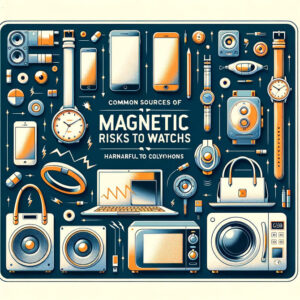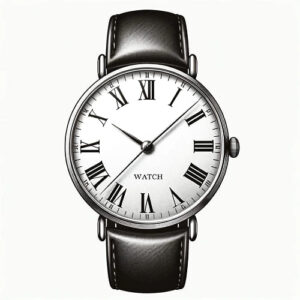Why Your Watch Stopped Working: Common Causes and Fixes

Watches serve as timeless pieces that do more than simply tell time; they are symbols of tradition, craftsmanship, and personal style. Given their critical role in our daily lives, it can be quite disconcerting when a watch stops ticking. The reasons behind a watch not working can vary widely, from straightforward issues like a watch battery dying to more intricate complications involving watch repair. Whether your timepiece is a luxury watch, a quartz model, or an automatic watch, understanding the common causes of malfunction can offer invaluable insight into maintaining its longevity. This article delves into the diverse reasons why your watch has stopped working, highlighting the spectrum from minor watch problems such as exposure to water or physical damage, to more severe issues stemming from poor construction or the need for professional repair. By exploring these causes and potential fixes, you'll be equipped to restore your cherished timekeeper back to its optimal state.
Battery Issues
One frequent reason behind a quartz watch ceasing its operations lies in battery complications. The heart of every quartz watch is its battery, which, when depleted or nearing its end, can cause the watch to stop ticking. Recognizing battery issues often begins with noticing a complete halt in time display or erratic timekeeping. Typically, watch batteries boast a lifespan ranging from 1 to 5 years, depending heavily on the watch's design and functionality. Replacing the watch battery is a straightforward fix that can breathe new life into a non-working watch, a task manageable by most individuals with the right tools. However, if you're unsure or if your watch is a luxury or water-resistant model, seeking professional help is advisable to avoid damage. Watch repair shops or professional watchmakers are equipped to safely replace your watch battery while ensuring the integrity and functionality of your timepiece remain intact.
Mechanical Failures
Mechanical watches, admired for their intricate craftsmanship, are equally prone to wear and tear arising from their complexity. These timepieces rely on a symphony of gears and springs, which over time can become worn or damaged, leading to the watch stopping or malfunctioning. Recognizing the signs of mechanical wear and understanding the need for regular servicing are crucial steps in safeguarding the longevity of your watch. Below is an overview of common mechanical failures and remedies:
Common Mechanical Failures and Remedies
| Common Issues | Description | Prevention/Fixes |
|---|---|---|
| Worn-Out Gears | Gears can deteriorate due to friction and regular use, affecting the watch's timekeeping accuracy. | Regular servicing by a professional watchmaker can identify and replace worn gears. |
| Failing Springs | The mainspring, responsible for powering the watch, can weaken or break. | Professional repair is essential, including replacement of the faulty spring. |
| Dust and Debris | Accumulation inside the watch can obstruct the movement's parts. | Regular cleaning during servicing helps prevent buildup and wear. |
| Lubrication Issues | Over time, lubricants dry out, causing increased friction and wear. | Servicing includes re-lubrication, ensuring smooth operation of the watch's internal components. |
Given their complexity, mechanical watch repairs should ideally be addressed by experienced professionals. Regular servicing not only fixes existing issues but can also preempt potential problems, maintaining the watch's precision and reliability.
Magnetic Interference
Magnetic fields, invisible yet omnipresent, significantly affect the functionality of both quartz and mechanical watches. Exposure to a magnetic field can cause watch components to become magnetized. This magnetization can lead to inaccurate timekeeping or even cause the watch to stop working. It's vital to understand and mitigate the risks associated with magnetic interference to maintain your watch's accuracy.
Common Sources of Magnetic Fields:

Tips for Demagnetizing a Watch and Avoiding Magnetic Interference:
| Prevention Tips | Description |
|---|---|
| Keep Away from Gadgets | Keep your watch at a safe distance from electronic devices known to emit strong magnetic fields. |
| Use Anti-Magnetic Cases | Use an anti-magnetic case to store your watch when not in use for added protection. |
| Regular Checks | Periodically have your watch checked by a professional for magnetic interference, especially if inaccuracies are noticed. |
Demagnetizing a Watch:
| Steps | Description |
|---|---|
| Identify Issue | If your watch is running too fast or has stopped, it might be magnetized. |
| Seek Professional Help | A professional watchmaker can use specialized equipment to demagnetize your watch, restoring its accuracy and functionality. |
Addressing magnetic interference is essential for ensuring the precision and longevity of your watch. By implementing simple preventative measures and seeking professional help when necessary, you can safeguard your timepiece from the negative effects of magnetic fields.
Impact and Shock Damage
Physical impacts and shocks are formidable adversaries to watches, regardless of their internal mechanisms, whether quartz or mechanical. These unexpected encounters can result in a spectrum of adversities, from visibly cracked crystals to more insidious issues like dislodged hands or, more critically, damaged movements that disrupt the watch's functionality. The intricate network of gears and springs within can suffer misalignments or breakages, rendering the timepiece inoperative. Consequently, watch repair becomes an unavoidable journey for many owners facing these challenges.
Understanding the susceptibility of watches to physical damage, it becomes paramount to gravitate towards designs engineered with shock resistance in mind. This protective feature can significantly mitigate the risks and preserve the longevity of the watch. Moreover, adopting conscious care habits, like removing your watch during high-risk activities, serves as a preventive measure. Ultimately, the blend of mindful usage and selecting watches constructed to withstand the everyday bumps and knocks can arrest the potential for impact-induced malfunctions, ensuring your timekeeper ticks unfalteringly.
Water Damage
Water ingress represents a significant threat, especially for watches without water resistance. It can cause anything from a misted dial, an aesthetic issue, to severe mechanical problems like corroded components and a seized movement. This highlights the critical role of understanding your watch's water resistance ratings and how they affect its interaction with water.
Water Resistance Ratings Explained
| Rating | Suitability |
|---|---|
| 30M | Resistant to splashes or brief immersion |
| 50M | Suitable for swimming in shallow depths |
| 100M | Ideal for snorkeling and swimming |
| 200M+ | Fit for diving and high-impact water sports |
Caring for Water-Resistant Watches
Maintaining a watch's water resistance is key. This involves actions like ensuring the crown is screwed down securely before water contact and getting the seals checked yearly by a professional. Despite their designation, water-resistant watches need careful attention to maintain their defense against water.
In instances of water damage, it's crucial to seek immediate repair to prevent further issues. Prompt moisture removal and repair can save a watch’s functionality, emphasizing the importance of quick action in preserving your timepiece.
Wear and Tear of Components
The passage of time not only ticks away seconds but also gradually wears down the components of a watch, impacting its functionality. Watches endure various stresses through regular use, notably on the crown, used frequently for time adjustments; the gasket, ensuring the watch remains sealed against dust and water; and the strap, subjected to daily wear and direct skin contact.
Prone Components and Maintenance Recommendations
| Component | Maintenance Tips |
|---|---|
| Crown | Check regularly for smooth operation; lubricate as needed. |
| Gasket | Replace every few years or at signs of wear. |
| Strap | Clean often; replace upon visible deterioration. |
Maintaining your watch involves more than just keeping it running; it's about preserving its appearance and precision. A routine maintenance schedule, including professional checks for the internal workings and timely replacement of worn external parts, is key to extending your timepiece's life. Being proactive about your watch's care allows you to enjoy its functionality and beauty for longer.
Conclusion
In summary, a multitude of factors ranging from battery depletion, mechanical wear, magnetic interference, physical damage, water exposure, to everyday wear and tear can lead to your watch ceasing its operations. Each of these issues elucidates the intricate balance of craftsmanship and care that timepieces demand. As watch owners, proactive measures such as regular maintenance, understanding your watch's limitations, and adopting protective habits can significantly extend the life of your cherished accessory. For instances that transcend simple battery replacements or require intricate attention, such as dealing with mechanical failures or water damage, it's imperative to seek the expertise of professional watchmakers. Their proficiency not only guarantees the restoration of your watch's functionality but also preserves its legacy. Regularly servicing your watch, akin to a ritual, ensures that this timeless companion continues to mark the moments of your life with impeccable precision and elegance.
Frequently Asked Questions (FAQs)
1. Why did my watch stop working all of a sudden?
Watches can stop working due to a variety of reasons, including battery depletion, watch battery died, exposure to water or magnetic fields, impact, physical damage, or internal mechanical issues. Regular wear and tear or poor construction may also contribute to a watch stopping unexpectedly.
2. Can I replace the battery myself, or should I seek professional help?
For simple quartz watches, battery replacement can be a straightforward DIY task with the right tools. However, for luxury watches, water-resistant models, or automatic watches, it's advisable to consult a professional watchmaker or a watch repair service to ensure the integrity of the watch is not compromised.
3. How can I tell if my watch has been exposed to magnetic fields?
If your watch is running too fast, running slow, or has stopped working, it may have been magnetized. Professional watchmakers have equipment to demagnetize your watch, restoring its functionality.
4. What should I do if my watch has water damage?
Water exposure, especially in watches that are not water-resistant, requires immediate attention. Quickly seek professional watch repair to remove moisture and prevent corrosion of internal components. Regular checks and maintenance can prevent future water damage.
5. How often should I have my watch serviced?
The frequency of servicing depends on the type of watch and its usage. Mechanical and automatic watches, for instance, benefit from servicing every 3-5 years to clean, lubricate, and replace worn parts. Quartz watches might need less frequent servicing but keeping an eye on battery life and water resistance is crucial.
6. Are all watches water-resistant?
No, not all watches are water-resistant. Watches come with differing levels of water resistance, usually indicated in meters (e.g., 30M, 50M, 100M). Understanding these ratings can help you protect your watch from unnecessary water exposure.
7. When should I seek professional watch repair?
For complex issues such as mechanical failures, physical damage, water damage, or if your luxury, quartz, or automatic watch stops working unexpectedly, professional intervention is recommended. A skilled watchmaker can diagnose and fix problems, ensuring your watch’s longevity.
